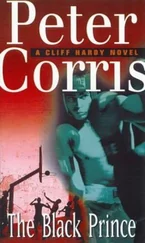Iris Murdoch - The Black Prince
Здесь есть возможность читать онлайн «Iris Murdoch - The Black Prince» весь текст электронной книги совершенно бесплатно (целиком полную версию без сокращений). В некоторых случаях можно слушать аудио, скачать через торрент в формате fb2 и присутствует краткое содержание. Год выпуска: 1973, Жанр: Классическая проза, на английском языке. Описание произведения, (предисловие) а так же отзывы посетителей доступны на портале библиотеки ЛибКат.
- Название:The Black Prince
- Автор:
- Жанр:
- Год:1973
- ISBN:нет данных
- Рейтинг книги:4 / 5. Голосов: 1
-
Избранное:Добавить в избранное
- Отзывы:
-
Ваша оценка:
- 80
- 1
- 2
- 3
- 4
- 5
The Black Prince: краткое содержание, описание и аннотация
Предлагаем к чтению аннотацию, описание, краткое содержание или предисловие (зависит от того, что написал сам автор книги «The Black Prince»). Если вы не нашли необходимую информацию о книге — напишите в комментариях, мы постараемся отыскать её.
The Black Prince
First published in 1973
To Ernesto de Marchi
The Black Prince — читать онлайн бесплатно полную книгу (весь текст) целиком
Ниже представлен текст книги, разбитый по страницам. Система сохранения места последней прочитанной страницы, позволяет с удобством читать онлайн бесплатно книгу «The Black Prince», без необходимости каждый раз заново искать на чём Вы остановились. Поставьте закладку, и сможете в любой момент перейти на страницу, на которой закончили чтение.
Интервал:
Закладка:
Iris Murdoch
The Black Prince
Editor's Foreword
I am in more than one way responsible for the work that follows. The author of it, my friend Bradley Pearson, has placed the arrangements for publication in my hands. In this humble mechanical sense it is through my agency that these pages now reach the public. I am also the «dear friend» (and such) who is referred to and at times addressed in the book. I am not however an actor in the drama which Pearson recounts. My friendship with Bradley Pearson dates from a time in our lives posterior to the events here narrated. This has been a time of tribulation when we needed and happily found in each other the blessings of friendship. I can say indeed with confidence that were it not for the encouragement and sympathy which I was able to give to Bradley, this story would probably have remained untold. Those who cry out the truth to an indifferent world too often weary, fall silent or come to doubt their own wit. Without my help this could have been so with Bradley Pearson. He needed someone to believe him and someone to believe in him. He found me, his alter ego, at the time needful.
What follows is in its essence as well as in its contour a love story. I mean that it is deeply as well as superficially so. Man's creative struggle, his search for wisdom and truth, is a love story. What follows is ambiguous and sometimes tortuously told. Man's searchings and his strugglings are ambiguous and vowed to hidden ways. Those who live by that dark light will understand. And yet: what can be simpler than a tale of love and more charming? That art gives charm to terrible things is perhaps its glory, perhaps its curse. Art is a doom. It has been the doom of Bradley Pearson. And in a quite different way it is my own.
... [1] One page missing
P. Loxias editor
Bradley Pearson's Foreword
... [2] One page missing
I am aware that people often have completely distorted general ideas of what they are like. Men truly manifest themselves in the long patterns of their acts, and not in any nutshell of self-theory. This is supremely true of the artist, who appears, however much he may imagine that he hides, in the revealed extension of his work. And so am I too here exhibited, whose pitiful instinct is alas still for a concealment quite at odds with my trade. Under this cautionary rubric I shall however now attempt a general description of myself. And now I am speaking, as I explained, in the persona of the self of several years ago, the often inglorious «hero» of the tale that follows. I am fifty-eight years old. I am a writer. «A writer» is indeed the simplest and also the most accurate general description of me. In so far as I am also a psychologist, an amateur philosopher, a student of human affairs, I am so because these things are a part of being the kind of writer that I am. I have always been a seeker. And my seeking has taken the form of that attempt to tell truth of which I have just spoken. I have, I hope and I believe, kept my gift pure. This means, among other things, that I have never been a successful writer. I have never tried to please at the expense of truth. I have known, for long periods, the torture of a life without self-expression. The most potent and sacred command which can be laid upon any artist is the command: wait. Art has its martyrs, not least those who have preserved their silence. There are, I hazard, saints of art who have simply waited mutely all their lives rather than profane the purity of a single page with anything less than what is perfectly appropriate and beautiful, that is to say, with anything less than what is true.
As is well known, I have published very little. I say «as is well known,» relying here for my fame upon publicity deriving from my adventures outside the purlieus of art. My name is not unknown, but this alas is not because I am a writer. As a writer I have reached and doubtless will reach only a perceptive few. The paradox perhaps of my whole life, and it is an absurdity upon which I do not cease to meditate, is that the dramatic story which follows, so unlike the rest of my work, may well prove to be my only «best seller.» There are undoubtedly here the elements of crude drama, the «fabulous» events which simple people love to hear of. And indeed I have had, in this connection, my own good share of being front-page news.»
... [3] One page missing
I shall describe myself a little more. My parents kept a shop. This is important, though not as important as Francis Marloe thinks, and certainly not in the way that he thinks. I mention Francis first of any of my «players» not because he is the most important: Francis is not important at all and has no deep connection with the course of these events. He is a subsidiary, a sidesman, in the story as I fear he is generally in life. Poor Francis will never be the hero of anything. He would make an excellent fifth wheel to any coach. But I make him as it were the mascot of the tale, partly because in a purely mechanical sense he opens it, and if on a certain day he had not, and so on, I might never, and so on. There is another paradox. One must constantly meditate upon the absurdities of chance, a subject even more edifying than the subject of death. Partly too I give a special place to Francis because he is, of the main actors in this drama, probably the only one who believes that I am not a liar. My gratitude to you, Francis Marloe, if you are still among the living and should chance to see these words. That another, later, believed me has proved of infinitely greater value. But you were then the only one who saw and understood. Across the aeons of time which have passed since that tragedy, I salute you, Francis.
My parents kept a shop, a sort of paper shop, down in Croydon. The shop sold daily papers and magazines, writing paper and so on, and horrible «gifts.» My sister, Priscilla, and I lived in this shop. I do not mean that we actually ate and slept in the shop. We did in fact often have our tea there, and I have a «memory» of sleeping under the counter. But the shop was the house and the mythical domain of our childhood. Some fortunate children have a garden, a landscape, as the «local habitation» of their early years. We had the shop: its drawers, its shelves, its smells, its endless empty cardboard boxes, its particular dirt. It was a shabby unsuccessful shop. Our parents were shabby unsuccessful people. They both died when I was in my thirties, my father first, my mother not long after. They lived to see my first book published. They were proud of me. My mother filled me with exasperation and shame but I loved her. (Be quiet, Francis Marloe.) My father I simply disliked. Or perhaps I have forgotten my affection for him. One can forget love, as you will perceive that I shortly find out.
I will not go on about the shop. I still dream about it at least once a week. Francis Marloe thought this very significant when I told him once. But Francis belongs to that sad crew of semi-educated theorizers who prefer any general blunted «symbolic» explanation to the horror of confronting a unique human history. Francis wanted to «explain» me. In my moment of fame, a number of other and much cleverer people attempted this also. But any human person is infinitely more complex than this type of explanation. By «infinitely» (or should I say «almost infinitely»? Alas I am no philosopher) I mean that there are not only more details, but more kinds of details with more kinds of relations than these diminishers can dream of. You might as well try to «explain» a Michelangelo on a piece of graph paper. Only art explains, and that cannot itself be explained. We and art are made for each other, and where that bond fails human life fails. Only this analogy holds, only this mirror shows a just image. Of course we have an «unconscious mind» and this is partly what my book is about. But there is no general chart of that lost continent. Certainly not a «scientific» one.
Читать дальшеИнтервал:
Закладка:
Похожие книги на «The Black Prince»
Представляем Вашему вниманию похожие книги на «The Black Prince» списком для выбора. Мы отобрали схожую по названию и смыслу литературу в надежде предоставить читателям больше вариантов отыскать новые, интересные, ещё непрочитанные произведения.
Обсуждение, отзывы о книге «The Black Prince» и просто собственные мнения читателей. Оставьте ваши комментарии, напишите, что Вы думаете о произведении, его смысле или главных героях. Укажите что конкретно понравилось, а что нет, и почему Вы так считаете.










